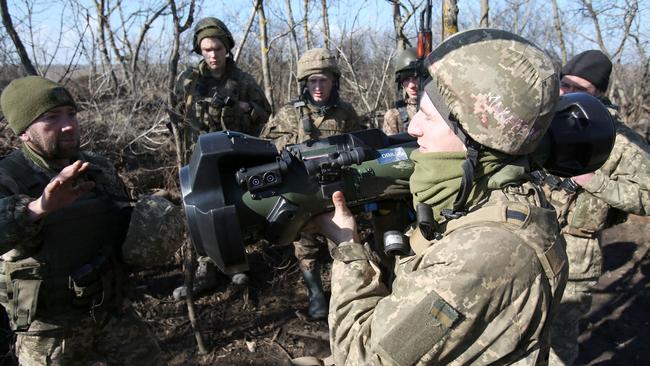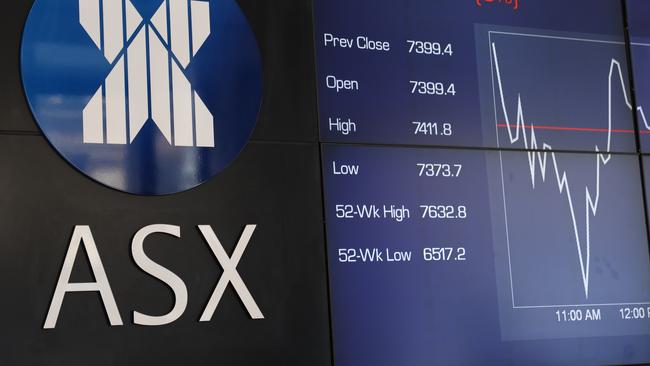$73bn wiped as Russia’s invasion of Ukraine sparks sharemarket turmoil
Australia’s benchmark fell 3 per cent amid global market turbulence as Russia began a full-scale invasion of Ukraine.

Investors wiped $73bn off Australian shares amid turmoil in global markets as Russia began a full-scale invasion of Ukraine after Russian President Vladimir Putin declared a special military operation.
While expected for weeks and preceded by Russia’s decision to send “peacekeeping” forces to separatist areas in Eastern Ukraine, the invasion that was announced midafternoon Australian time triggered additional risk aversion and safe haven demand in global markets.
Australia’s S&P/ASX 200 share index fell dived 246 points or 3.4 per cent to a three-week low of 6959.3 points, before closing down 3 per cent at 6990.6.
The Australian dollar fell 0.9 per cent to a three-day low of US71.69c and the 10-year bond yield dropped 12 basis points to 2.15 per cent.
At the same time, S&P 500 futures fell 2.5 per cent and Euro Stoxx 50 futures dropped 4 per cent, pointing to a rough night ahead. US 10-year bond yields fell 13 basis points to 1.86 per cent, Brent crude oil futures surged 5.8 per cent to an eight-year high of $US102.58 a barrel and spot gold rose 2.1 per cent to a 14-month high of $US1,908.84 per ounce. The US dollar index rose 0.9 per cent against the euro but bitcoin fared badly, dipping as much as 8.5 per cent to $US34,337.47.
Plunging European and US equity futures and surging oil prices also weighed on Asian markets.
Japan’s Nikkei 225 index fell 1.9 per cent, China’s CSI 300 fell 2.1 per cent, the Hang Seng index lost 3.2 per cent, South Korea’s KOSPI fell 2.6 per cent and Taiwan’s TAIEX lost 2.6 per cent.
Australia’s sharemarket was worst off because of ex-dividend falls in heavyweight stocks including BHP and Woodside Petroleum. After bouncing off its low, the S&P/ASX 200 closed only about 0.3 per cent weaker than where it was before Vladimir Putin’s speech announcing the invasion.
“Things have clearly deteriorated over the last half a day (in Ukraine),” said a senior institutional trader at a major bank. “We have had this incredible, continued value rally.”
But he saw little evidence of “huge specific trades” in Australian shares due to Ukraine.
“One reason is people are already pretty nicely weighted in energy and commodities which are beneficiaries of this conflict – energy is also a reasonably positive story from a demand perspective.”
“This has coincided with the two busiest days of the reporting season, so what we’ve seen is more very much ‘bottom-up’ (investing around company reports).
The value of trades was worth $11.6bn, which was 11 per cent above the 20-day moving average.
“With what is happening, you would expect a flight to US dollars, bonds, gold and oil, and added economic uncertainty that puts a question mark over the number of US interest rate hikes this year.”

He added that if US rate hike expectations do fade as a result of economic uncertainty from Ukraine, investors would be more likely to focus on long-dated interest-rate sensitive infrastructure stocks “rather than going headlong back into tech.”
“A key question here will be how much of Ukraine does Russia actually wish to occupy,” said CBA’s head of fixed income and FX strategy.
“Many people on the far side of Ukraine consider themselves Russian – hence the breakaway republics. The further west Russia moves the less hospitable the terrain is, at least politically.”
In a nationally televised address ahead of the offensive, Putin said Russia doesn’t plan to “occupy” Ukraine but said the action was necessary, accusing the US and its allies of crossing Russia’s “red line” by expanding the NATO alliance.
Still, a civil war in Ukraine would be “both a huge growth shock to the European – and global economy – and inflation shock”, said IG market analyst, Kyle Rodda.
“That’s a dangerous mix, because the supply disruptions in commodity prices would drive costs higher, and exacerbate the inflation central banks are already struggling to contain.”
“That means the Fed – and others – would be unable to buffer the shock, and would potentially have to tighten policy – a very negative scenario for risk assets.”
J.P. Morgan chief economist Bruce Kasman, said a “negative oil supply shock” is poised to weigh on the global economic growth outlook, but recent developments globally “point to more modest drag than our January adverse scenario.”
Iran supply may “cushion a retaliatory Russia pullback” from gas and oil supply to the West and a “fading Omicron drag starts to boost activity.”
He said an oil price shock arising from a Russian invasion of Ukraine that materially curtailed Russian oil supply, causing sharp 2.3 million barrels a day contraction in oil supply, pushing Brent crude prices up to $150 a barrel in the March quarter would have a “large immediate impact on the global economy, subtracting 3 per cent per annum from global GDP, while adding 4 percentage points to global CPI inflation during the first half of the year.
“Expectations of a sharp contraction in Russian oil supply may still materialise if the conflict broadens and prompts a wide range of Western sanctions, but this is not yet underway,” Mr Kasman said.
“The US administration has not brought the full force of all envisaged sanctions as the first response to a Russian invasion of Ukraine, which was the scenario most likely to disrupt energy supply.”
Sanctions have so far been limited and the most draconian measures — cutting off Russian corporations and financial institutions from rouble convertibility into US dollar and financial messaging services aren’t certain to be employed.
“It is possible that sanctions escalate without the US triggering these extreme measures which are most likely to elicit a withdrawal of Russian energy supply,” added.
As Russian forces attacked targets across Ukraine after leader Vladimir Putin ordered an operation to demilitarise the country, US President Joe Biden declared the US and its allies would impose “severe sanctions” after the “unprovoked and unjustified attack”, saying the “world will hold Russia accountable.”
But risk around Russian supply is not the only factor impacting oil markets, as negotiators in Vienna are signalling a nuclear agreement with Iran may soon be reached.
“A return of Iranian production to the market could offset a significant portion of the estimated fall in Russia’s supply (and) based on the latest news we now forecast that Iran will ramp up production by close to 1mbd over the course of this year,” Mr Kasman said.





To join the conversation, please log in. Don't have an account? Register
Join the conversation, you are commenting as Logout